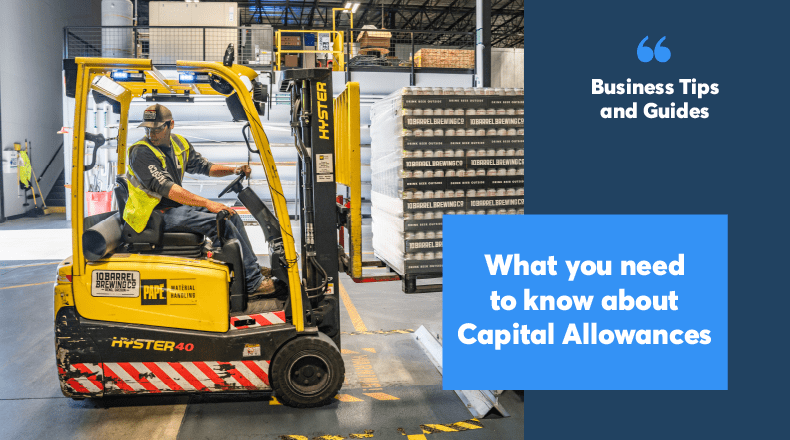Not claiming the full capital allowances you’re entitled to is like throwing money away.
Capital allowances can offset your business income and reduce the amount that ends up in the tax man’s pocket.
That’s why it’s important to stay on top of this tax area. To help, we’ll run through a capital allowances 101 and discuss temporary measures introduced post COVID-19 to stimulate economic recovery.
What is capital allowance?
Capital allowance is the deduction taxpayers can claim for the decline in value – or depreciation – of assets they use to earn their income.
Not all assets can be depreciated. Land, trading stock and some intangible assets can’t be depreciated. Neither can consumables like stationery.
Businesses of all sizes, rental property investors and even employees can claim capital allowance deductions.
The idea is that you can’t immediately claim a full tax deduction for buying capital assets, but you can claim costs over time.
It’s worth noting that tax depreciation is different from accounting depreciation. While both aim to account for decline in asset values as a cost of doing business, they’re governed by different rules.
Why should you care?
So why go through the trouble of tracking asset values and claimable amounts?
We’ve touched on how capital allowances can lower your taxable income and therefore you tax bill. There are significant cash flow benefits at stake, particularly for companies that heavily rely on plant and equipment to operate.
General depreciation rules
Unless you’re eligible to use simplified depreciation for small businesses, you’ll have to follow general depreciation rules to determine the deductible amount you can claim.
This is calculated using either the prime cost or diminishing value method, taking into account an asset’s effective life.
Effective life is essentially how long the asset can be used to produce income.
Underpinning the prime cost method is the assumption that the value of depreciating assets decreases uniformly – in a straight line – over its effective life.
The diminishing value method on the other hand, supposes value decreases more in early years of use than later years.
For businesses, low value assets costing up to $100, which are used to earn income, can be written off immediately.
Capital allowances entitlement
Normally, only the legal owner of the capital asset is entitled to the tax depreciation deduction.
Cost of a capital asset includes:
- The amount you paid for it
- Transport and installation costs
- Cost of repairs required immediately after purchase
It’s important to remember that like other tax deductions, depreciation deduction is limited to business use.
This means if a piece of equipment is used for a business purpose 60% of the time, then you can only claim 60% of total depreciation for that tax year.
Simplified rules for small business
To make life easier for small businesses, different rules apply for those with aggregate turnover of less than $10m.
Aggregated turnover is your annual turnover plus the annual turnover of any connected or affiliated businesses.
Simplified depreciation rules allow:
- Instant asset write-off for assets that cost less than the prescribed threshold.
- Pooling of assets that cost more or the same as the threshold. This enables you to calculate your tax deduction based on the value of the pool rather than calculating deductions separately for each asset.
Can capital allowances create a loss?
The short answer is yes.
Even if you’re a startup that isn’t yet profitable, a tax loss can be carried forward to offset taxable income in future years. This makes capital allowances a powerful tool for tax planning.
Recent Changes
In response to the COVID-19 outbreak and its economic impact, the Australian government has made capital allowances more generous. Both as a way to lend a helping hand for businesses and to encourage investments.
Temporary full expensing
Temporary full expensing allows purchases of capital assets to be claimed as tax deductions immediately rather than over time.
This applies to business with aggregate turnover of less than $5bn and for eligible depreciating assets that are new.
The asset must be first used or installed ready for use for a tax purposes between 6 October 2020 and 30 June 2023.
Eligible second-hand depreciating assets can also be expensed, but only for businesses with aggregate turnover of less than $50m.
Businesses can immediately deduct costs incurred to improve depreciating assets as well.
Additionally, those with aggregated turnover of under $10m can claim the balance of their small business pool at the end of each income year from October 2020 and 30 June 2022.
Instant asset write-off changes
For assets first installed ready for use from 12 March 2020 to 30 June 2021, and purchased by 31 December 2020, the instant asset write-off threshold stands at $150,000. It’s available to businesses with aggregate turnover of less than $500m.
Backing business investment measure
As an added investment incentive, the government is also offering accelerated depreciation deductions. This is for businesses with aggregate turnover of less than $500m, for buying new depreciating assets like machinery and equipment.
Specific intangible assets such as a patent could qualify as well.
You can either deduct 50% of the asset’s cost then apply existing rules to the balance. Or if you’re using simplified depreciation rules, you can claim 57.5% of the asset’s cost in the first year you add it to your small business pool.
The asset must be first used or ready for use in the 15 months from 12 March 2020 until 30 June 2021.
Get the job done
Calculating your capital allowances every tax year can be hard work, but it doesn’t have to be that way.
You can take advantage of ATO’s depreciation and capital allowances tool to determine the deduction available from a depreciating asset. Plus you can also use it to calculate the claims you’re entitled to. Using accounting software can save you time too because once set up, calculations happen automatically.
But tapping into advice from tax experts like POP Business will give you confidence and peace of mind that you’re doing everything right. You’ll be able to prevent problems with over or under-claiming your capital allowances. We’ll also keep you informed of the latest changes and what they mean for your business, so you can strategise your purchases and claims accordingly for maximum tax savings.
Being a Xero Platinum Partner means we can connect you to the cloud and help you get more from your accounting software too. We offer a 20% discount for clients to make the transition even more affordable.
Conclusion
Capital allowances as a tax area is undergoing significant changes in light of the efforts to combat the economic damage from COVID-19.
Temporary measures introduced are designed to help, but navigating new rules can be confusing.
Talk to your trusted adviser – talk to us at POP – to make sense of what’s going on. You stand to gain incredible tax savings for your business in this uncertain and challenging period.



